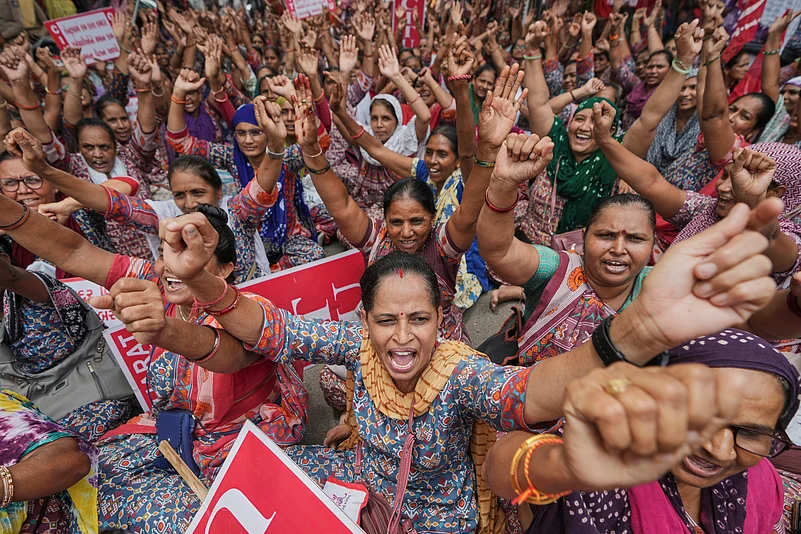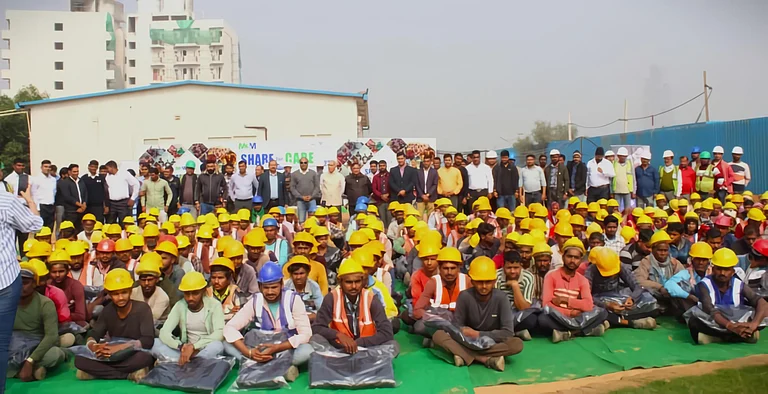A nationwide general strike, or "Bharat Bandh," called by a united front of ten central trade unions, brought parts of the country to a standstill on Wednesday.
The forum, led by the All India Trade Union Congress (AITUC), claimed that an estimated 25 crore workers participated in the strike to protest against the central government's economic and labour policies. The impact was felt across numerous sectors, including banking, postal services, electricity, mining, and public transport.
Why Was the Bandh Called?
Nationwide protests are underway, driven by a coalition of trade unions and farmer organizations demanding significant policy changes from the government.
Their core grievances centre on five key demands: the repeal of the four new labour codes, an end to the privatization of Public Sector Undertakings (PSUs) and the contractualisation of the workforce, an increase in the national minimum wage to ₹26,000 per month, a legal guarantee for Minimum Support Price (MSP) for all crops based on the Swaminathan Commission's 'C2 plus 50 percent' formula, and a comprehensive loan waiver for farmers.
According to AITUC General Secretary Amarjeet Kaur, the strike has seen widespread participation, particularly in states such as West Bengal, Kerala, Jharkhand, Karnataka, Tamil Nadu, and Bihar.
Political Leaders Join Protests on the Ground
The strike saw active participation from prominent political leaders across the country.
In Bihar, Congress leader Rahul Gandhi and RJD's Tejashwi Yadav joined the "chakka jam" protests. Their participation was also directed against the special intensive revision of electoral rolls in the poll-bound state.
"On the directions of Modi ji and Nitish Kumar, the names of the poor people are being removed from the voter list. Modi ji and Nitish Kumar ji's 'dadagiri' will not work," Tejashwi Yadav declared. Echoing the sentiment, NSUI National-In-charge Kanhaiya Kumar stated, "We have come out on the streets to protect democracy. If the streets become silent, then the Parliament goes astray."
In Mumbai, leaders of the Nationalist Congress Party (SP) lent their support to a major teachers' protest at Azad Maidan. NCP (SP) chief Sharad Pawar and MLA Rohit Pawar joined the demonstration of 62,000 unaided teachers from Maharashtra. "Teachers have only one demand," Rohit Pawar explained, "to fulfil the GR (Government Resolution), which the government took out before elections. They demand the GR to be implemented."
Kerala Witnesses Complete Shutdown Amid Sporadic Tensions
The strike was particularly effective in the CPI(M)-ruled state of Kerala, where a near-complete shutdown of government institutions and public life was observed. General Education Minister V Sivankutty expressed his solidarity by walking nearly two kilometres to his party office in Thiruvananthapuram instead of using a vehicle.
However, the day was not without tension. In Kannur district, strike supporters reportedly deflated the tires of seven cars carrying 15 teachers affiliated with the RSS to their school. In a separate incident in Kasargod, a teacher was allegedly locked inside a staff room by protesters for opening her school, requiring police intervention to be released.
Disruptions and State Responses in Bihar and West Bengal
Beyond the high-profile political protests, the "Bihar Bandh" saw workers from opposition parties disrupting road and rail traffic to enforce the shutdown. In Gaya, leaders of the Mahagathbandhan and trade union representatives held a large procession that moved through the city's main commercial areas.
In contrast, the West Bengal government made elaborate arrangements to ensure normal life was not affected. While strike supporters attempted to block roads and rail lines in places like Diamond Harbour and Shyamnagar, a heavy police presence ensured the smooth movement of traffic.
Police in Kolkata arrested 19 protesters, including SFI's All India General Secretary Srijan Bhattacharyya, from a protest site in the city.





























